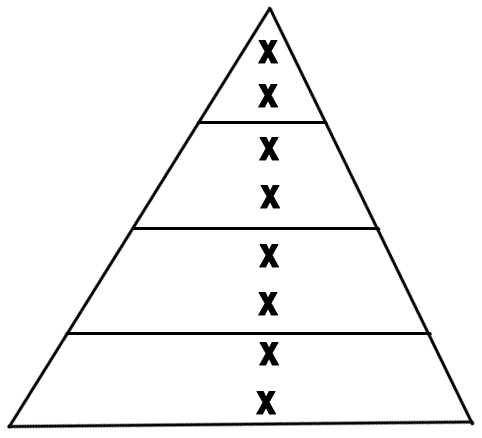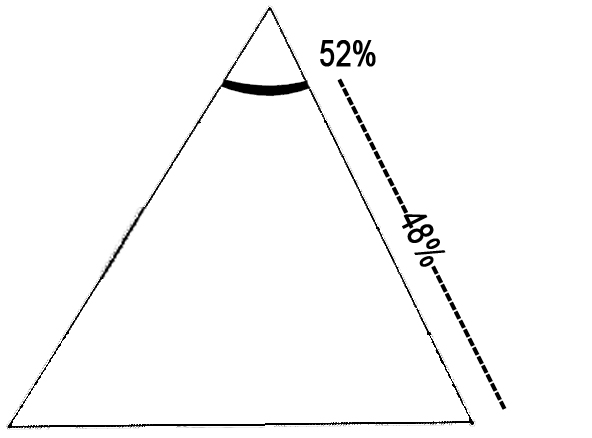.
.
.
.
.
.
UNIT ONE: OUTPUTS OF THE SYSTEM
Day Three: Chapter one (continued)

We appear in this data somewhere.
Why complacency?
Why don't they vote?
obstacles to effective political participation.
factor #1 psychological. eg. cynicism.
Senate studies showed:
1964 ⅓ electorate was cynical.
1972 ½
They know we don't care.
What did they mean by cynicism?
electorate
- dis-illusion-ment with government.
Democracy in reality is a FARCE
cognitive dissonance →
(to know) (disagreement)
conflicting messages.
genuine human need for agreement.
- attack the message
- attack the messenger
- change yourself
Leon Festinger -- the 50 ¢ group
→ next stage — ambivalence →
attracted and repelled equally
→acquiescence
remain quiet
- distrust of govt
- attendant feelings of helplessness
- attendant feelings of lack of influence

masses
- feeling personally isolated from the system ("Alienation")
- feeling of no power or importance ("marginality")
- feeling that society is lacking direction or meaning
not knowing or wanting to know ("anomie")
"lawlessness is anarchy" he says.
cynicism does not stop some from participation.
non-struggle
cynicism is common
most who "play the game" are just as cynical as we are
obstacles to effective political participation. (voting)
- Psychological factors
cynicism
- "Pragmatic"(realistic) factors
ex: size of the population
--as the population grows, your vote shrinks in impact -- (influence)
--could make you cynical do we vote as individuals? no.
to vote for 99m voters -- must have 99 candidates
which would make vote equally obsolete.
- structural factors
ex: Iron Wall of Oligarchy (rule by a few)
--applies all the time
--Iron-clad (all organizations, all institutions all have iron law)
[autocracy/monarchy/gerenocracy/theocracy/plutocracy, etc.]
--any organization will inevitably or eventually:
- ruled by a few (oligarchy)
- attempt to perpetuate itself
| (elite theorists really beleive this) |

|
|
↑
|
|
ones on the bottom
(masses)
|
| do not make the decisions.
|
family/company/school/church/army
oil<---cotton<---cattle perpetuate itself
 =
=
Fidel Castro ...... Baptista
From Cuba to Latin America
- legal factors (obstacles)
- Women-1919 (federal) (defeated in Texas Legislature in 1917)
- military (national guard) 1931
-go back to post reconstruction era- former military could not hold office. resentment of union army.
- white primary unconstitutional: 1944 since 1906
- military (all) 1965- full suffrage
- poll-tax 1966 (since 1902)
- property requirements - 1969 (bond election)
- property requirements- 1969 (tax election)
- annual registration requirements - 1971
- early registration requirements - 1971
- long residency requirements- 1972
- property requirements - all elections 1975
courts do not make sweeping issues--only specific issues (law)
govt policy to keep people from voting
maybe they do not want you to
select groups
the poor..... women..... blacks.... etc.
| unit 1 |
unit 2 |
unit 3 |
OUTPUTS
(policies) |
←Decision
Making
Process |
←INPUTS(obstacle) |
| |
|
rich ↑v poor↑ (struggle)↑ (poll tax) |
| ∟→ |
→ |
→↑ |
| old outputs become new inputs |
annual registration 1971
(economically mobile)
Texas uses early registration 1971
Long residency requirement 1972
property requirement all elections 1973
districting
(military)
obstacles are only designed to
stop those in texas who are
economically mobile/ and others who
are considered undesirable
- districting 1991
(one man, one vote)
- no literacy test
in iliteracy Texas ranks 4:50
(4th in the US) too many iliterate are white.
- court has always treated this as a political question
- other southern states had literacy tests
theyve tried everything to keep you from voting.... so maybe you should not.
- political factors
(subtle)
- ex: diversion/distraction v. systemic analysis--diverted from it
[competitive individualism]
"don't look at society -- look at individuals."
last things elites want to see is masses on the move.
divide and conquer. individualism over collectivism.
- ex: "co-optation"/ (not so subtle) (p.10 in workbook at bottom.) (glossary)
(they buy you out) the system buys off and corrupts.
- ex: "political socialization" -- how you learn your values (media, family)
"repression" <---vicious, crude, not subtle
- comprehensive factors (socio-economic-politico-)
(distribution of resources)
- wealth
|

|
=OUTPUTS
(Unit I) |
- income
|
- capital
|
- property
|
- information
(info: not to be underestimated ) |
- education
|
- legal resources
|
- political resources
|
- etc.
|
who gets what
UNIT I=OUTPUTS=DISTRIBUTION OF RESOURCES
(distribution of resources as obstacle to prevent political participation)
look in data for:
- "stratification"
(is inequality)... resources are stratified

on the basis of the unequal stratification of (their unit of measure)
--object being studied-- (income, authority, etc.)
class
in unit I: money(unit of measure is class).
- used to govern
--somebody will be governed
--somebody needs to be governed
- concentration
- institutional rather than individual
where the power is
...real game is being played
- "systemic" (workbook:p 10)
- socialization (ex: values)
*Jimmy Carter comes up alot as example*
Institutional Players of the Game
DATA
Institutions
- Corporations
GM has larger net sales than New Zealand GNP.
Exxon....Venezuela (OPEC nation)
- 200,000 Industrial Corps.
- top 5 (Exxon, GM, Mobil, Ford, Texaco) (Control of Area Assets) 10%
- top 20 (top 13 in the world)
- top 100 -------------------------------------------52%

- top 500
1954 =50% of industrial sales
and ⅔ of all industrial earning
1972 =⅔ of sales ¾ earnings
1980 ----------------------------------->70% (mining, manufacturing)
1980 72% employees/workers
highly concentrated at "the top".
- 67,000 utilities/transportation/communications
top 33-------------------------------------------->50%
- 14,541 banks (highly liquid)
top 3 (B of A, CitiCorps, Chase-Manhattan) --> 14%
top 50 ---------------------------------------> 48%
- 1,790 Insurance Companies (highly liquid: deal in money)
top 2 (prudential, Metropolitan) ----------------------------->25% +
top 18 ---------------------------------------------->⅔
| President/Directors |
=3,572 individuals |
| of the top 201 corporations (maority of all assets) |
occupy more than one institutional position -- at the same time -- |
| almost incomprehensible amount of $$$$ |
"Revolving Door Phenomenon" |
| ex: "In and Outers" -- |
"Overlap" -- they are all the same people
*perpetuating the system |
| |
backgrounds are all the same
same income, class,religious background |
Questions:
Kenneth M. Dolbeare and Murray J Edelman. American Politics: Policies, Power, and Change, 5th ed. 1985
What does it mean that the United States is a (stratified) capitalist society? (p. 8)
- It means that the productive resources of society are all owned by private individuals or corporations
and operated so as to produce profits for their owners.
services are also privately owned and operated for profit.
Most people are not owners and must earn their livlihoods by working for those who are.
- the social structure is shaped by patterns of wealth/income distribution created by the economic system.
relatively few people (owners, etc) receive a large share of wealth.
a larger number of people receive a smaller proportion of income.
Status and power are stratified in the same manner, creating a class system.
- values of society support economic system:individual self-seeking, materialism, work ethic, profit motive, respect for private property.
Cf. "benefits and burdens" (who should benefit and who should pay). (pp. 16-17)
Public policy have historically supported and encouraged national economy...
benefits whoever happens to be favoured under current conditions.
Who will benefit and who will pay is an insistent value question.
Cf. "Revolving Door" phenomenon. (p. 18)
Thomas R. Dye. Who's Running America? The Reagan Years. 1983:
These top positions taken collectively, control half of the nations industrial assets.... banking, insurance, investments networks, newspapers, law firms... occupy key government and military positions.
.
.
.
.
.
.

 =
=




